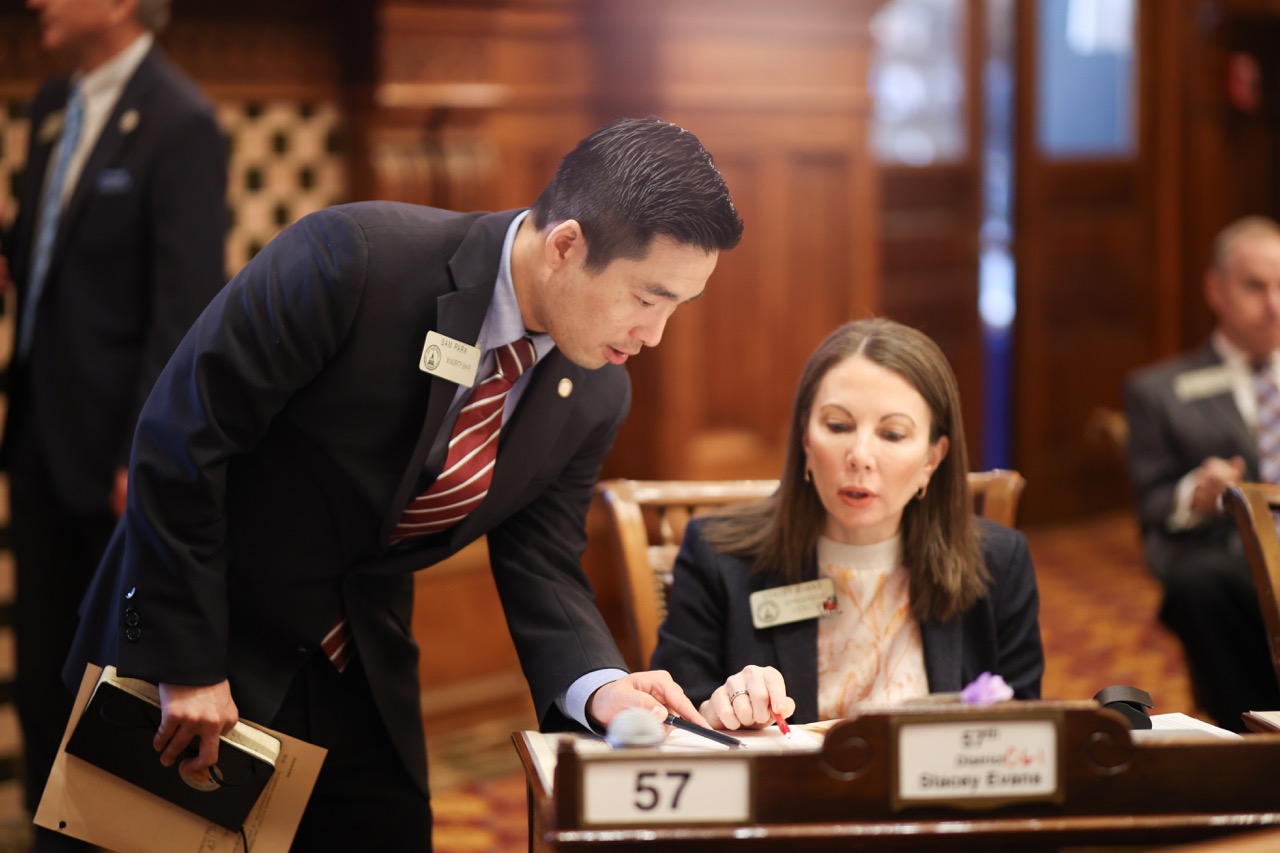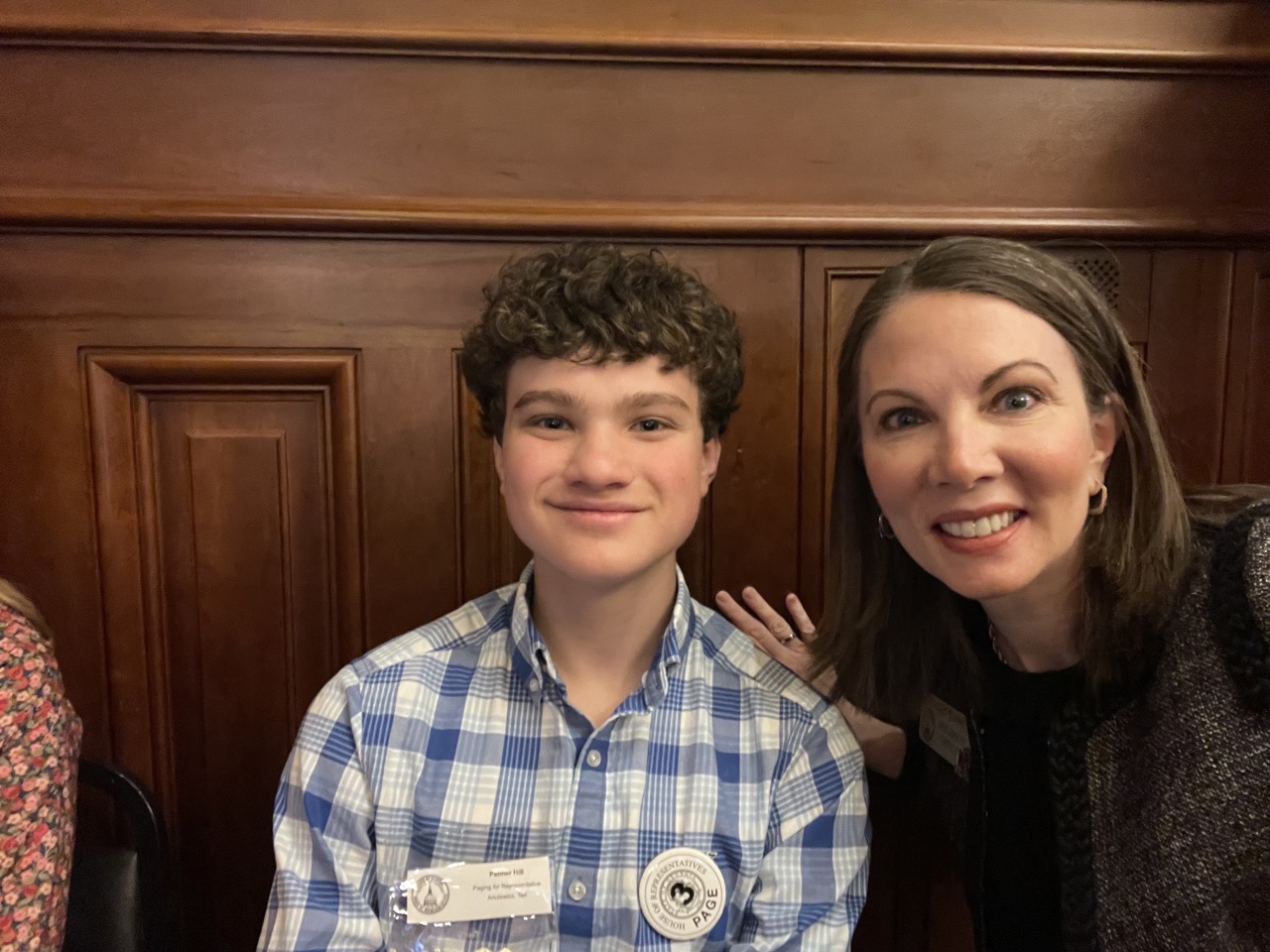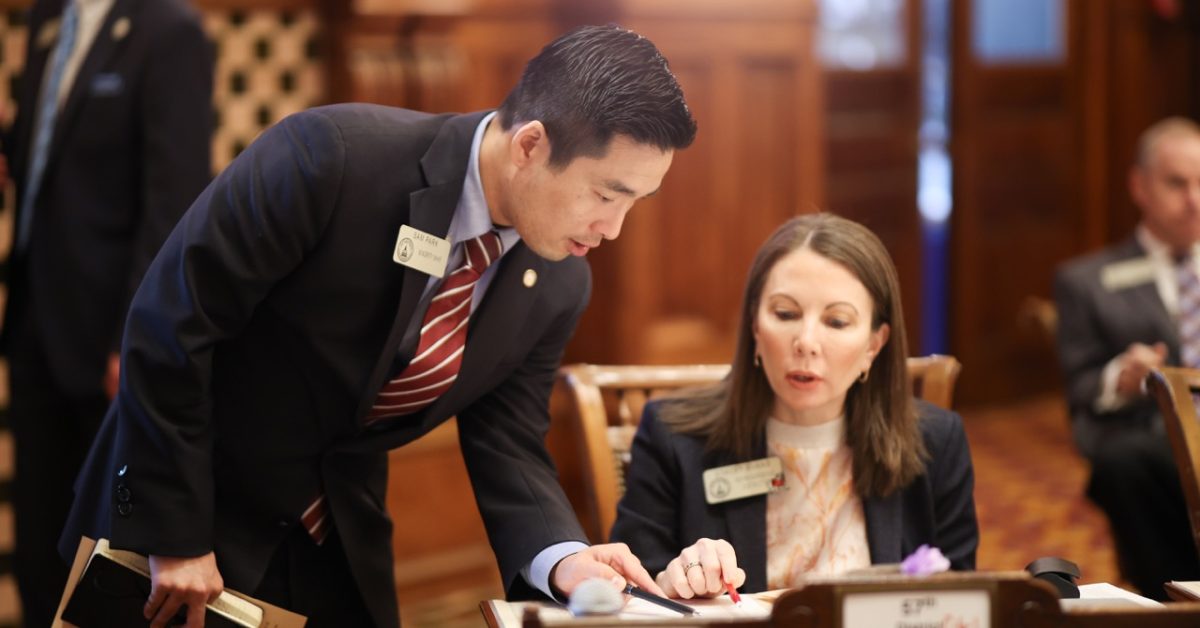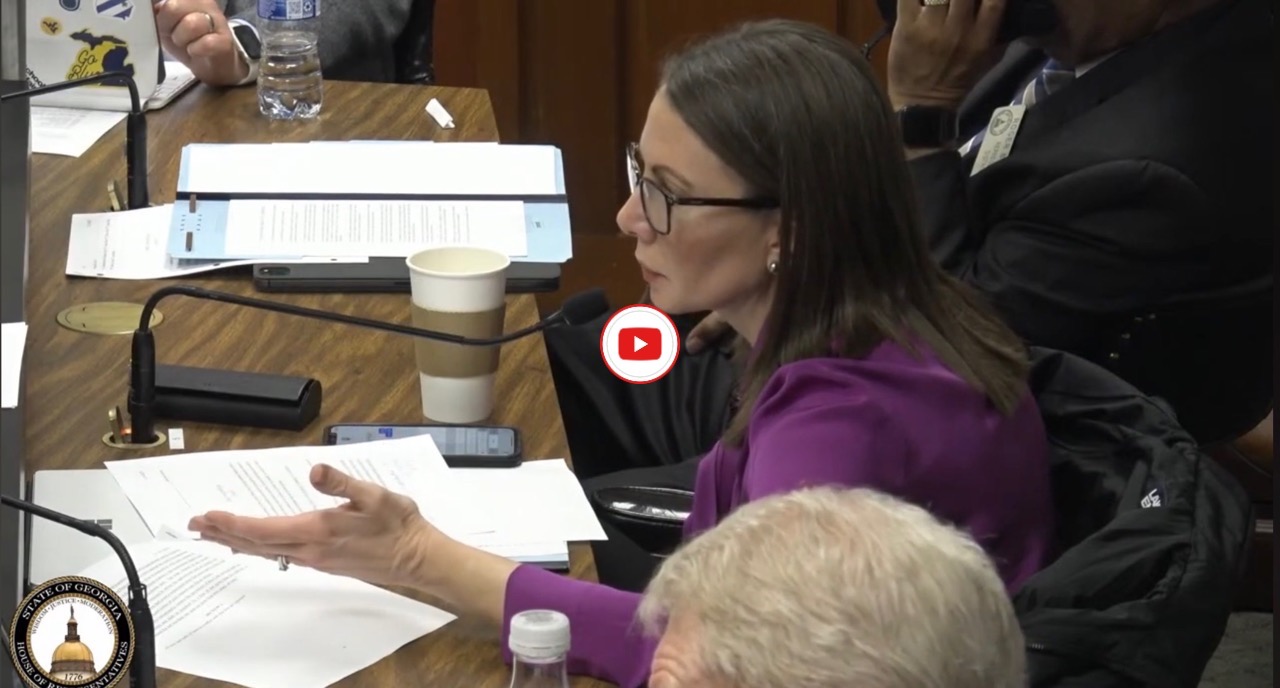This was the eleventh and last full week at the capitol for this year’s session. It has gone by quickly but has been very eventful! Next Thursday, March 28th, will be the last day of session (Sine Die).

Oopsy! I will have a general election opponent
Two newsletters ago I told you I was unopposed in the upcoming election. That was wrong. I had overlooked something on the Secretary of State’s qualification website (wishful thinking I suppose!). While I do not have a primary opponent, I WILL have an opponent in the general election this year. I appreciate your continued support and hope to earn your vote to continue to serve as your voice under the Gold Dome!
Save the Date! Post-Session Town Hall
We will be having our last town hall of the 2024 Legislative Session on Tuesday, April 9th at 7pm. State Senator Sonya Halpern and I will bring you the latest news from the Gold Dome post-session and answer any of your questions. You can register here.

Fighting Against Hateful Discriminatory Land Laws
SB420 is similar to HB1093 which passed out of the Agriculture and Consumer Affairs committee earlier this session. SB420 was assigned to the Judiciary committee where I was able to ask questions and fight against it, you can watch that below. It passed the House floor on Thursday with a 97-67 vote. The bill would exclude certain non-citizens from owning certain farmland, including housing.
These types of bills claim to protect our national security but fall short of this goal. It will only weaponize discrimination against those in the communities mentioned in the bill and fuel anti-immigration efforts. Pushing this dangerous and racist rhetoric only threatens our communities and weakens our national security. This issue as it may relate to national security is covered by federal law and no further state law is needed.
Republicans fail to expand healthcare access yet again
There was once hope earlier this session that we would be able to expand Medicaid, but unfortunately, Republicans have punked out AGAIN and killed Medicaid expansion in a Senate committee on Thursday.
HB1339 was passed out of the Senate last week as a substitute and came back to the House with no provisions for Medicaid expansion. This bill would loosen state regulations governing where healthcare facilities can operate, known as a certificate of need, and is being pushed to give the governors failing Pathways program more time to work. The bill was passed out of the House again and was agreed to by the Senate on Thursday. It now moves to the governor to be signed.
This bill is an insufficient solution for the healthcare coverage gap that currently puts more than 400,000 Georgians at risk, all to serve a partisan agenda. We need comprehensive and affordable health coverage now!
Using Lottery funds for education as intended
Every year the Lottery deposits certain revenues into the Lottery for Education Fund, which goes to fund HOPE and Pre-K. Certain of those funds go to a “reserve fund,” which is required by law to be 50% of prior year proceeds. The required reserve amount is currently about $700 million. The reserves are currently over $1.9 BILLION (yes, with a “B”)—in other words, $1.2 BILLION higher than required by law.
Georgians did not approve a Lottery to just have a Lottery, they did so to fund HOPE and PreK. This week the House passed HB353, which included my language to force spending of the excess reserves over time—10% of the excess each year. This is a huge win for HOPE and pre-K!
Wrongful Conviction Panel needed
On Wednesday we worked to bring attention to the fact that Georgia has no uniform or systematic pathway for those who were wrongfully convicted to seek compensation for time spent behind bars for crimes they did not commit when they are exonerated. Other states have dealt with this issue and provided a predictable pathway to justice, but not Georgia. So, along with several other representatives and men who have been exonerated after spending time in jail for crimes they did not commit, I spoke to the press regarding the issue.
There are currently 6 resolutions that have passed the House (2 of which I have sponsored) to compensate 6 individuals who were wrongfully imprisoned but these resolutions remain stuck in the Senate with no movement. There is also a bill stuck in the Senate that would establish a panel to consider compensation decisions rather than forcing those exonerated to find a representative to sponsor an individual resolution. That is Rep. Scott Holcomb’s HB364.
Special Visitors at the Capitol
McCracken Poston is a former House member who was my state representative growing up. He visited and shared information about his book Zenith Man! It is a great book, I encourage you all to read it! You can order it here.

It was great to see Palmer Hill on the floor of the House this week. He was a page for Representative Teri Anulewicz, but his mom is a great friend from childhood, college, law school, today, and forever. It was great to see him around the Capitol!

Other Bills that Passed in the House
Judiciary
SB465 would create the crime of aggravated involuntary manslaughter when someone intentionally manufactures or sells a controlled substance that contains fentanyl and fentanyl is determined as the sole cause or a contributing factor in a victim’s death. In the prosecution of this crime, the government would not need to prove that the defendant knew fentanyl was present in the drug. Anyone who violates this offense would be found guilty of a felony and subject to imprisonment between 10 and 30 years. Additionally, SB 465 would create a felony crime for unlawfully possessing, purchasing, delivering or selling a pill press or tableting machine if there is reasonable cause to believe that the item will be used to manufacture a controlled or counterfeit substance. This bill is known as “Austin’s Law,” named after a young man who died tragically after unknowingly taking a substance laced with fentanyl. I voted yes.
SB493 would introduce several provisions related to the protection of minors and certain regulations concerning individuals on Georgia’s sex offender registry. First, this bill would make it a crime for a person to use an unmanned aircraft, such as a drone, to intentionally photograph an individual, particularly a minor, without parental consent. The bill would also prohibit a person who is on the sex offender registry from knowingly owning or operating a drone used to photograph or observe any person in any way that violates that person’s reasonable expectation of privacy. This bill would also allow certain individuals on Georgia’s sex offender registry to petition the superior court to be removed from the registry after reaching the age of 80 years old and completing all prison, parole, supervised release, and probation for the offense. This bill would not only be crucial for protecting Georgia’s minors from registered sexual offenders but would also play a significant role in building safer and more secure communities for all Georgians. I voted yes.
SB433 or the “Donor Intent Protection Act”, would require a charitable organization or trust that accepts a contribution under an endowment agreement to not violate the terms of any donor-imposed restriction. If a donor-imposed restriction is violated, the donor, the donor’s lineal descendants, or the donor’s legal representative could bring a civil action within four years after discovering a breach of the endowment agreement. If a court finds a violation, the court would be authorized to order a remedy consistent with the charitable purposes expressed in the endowment agreement. The court, however, would not be authorized to order the return of the contribution. I voted yes.
SB454 would revise the child support award calculation worksheet and rates and would clarify that the definition of custodial parent applies to the parent who earns the lesser amount of gross income and would change the process of editing child support awards to include a low-income adjustment system rather than a deviation. The bill would allow disability benefits received by the child from the U.S. Department of Veterans Affairs to count against the noncustodial parent’s final child support amount. I voted yes.
Education
SB440 would simplify the dual enrollment program and improve academic flexibility to better align with pathway programs. Under this legislation, this diploma path would only be available for an associate’s degree in applied science within Georgia’s Technical College System (TCSG) or TCSG programs included in the State Workforce Development Board’s high-demand career list. Additionally, this bill would introduce the Dual Enrollment ACE (Accelerated Career Education) grant program, which would provide financial assistance to eligible students participating in the Accelerated Career Diploma Program. These students would be exempt from the 30-hour dual enrollment cap, and the bill would allow dual enrollment funding to be distinguished between academic and technical students. I voted yes.
SB464 would make changes to the Georgia Early Literacy Act to require the Department of Education (DOE) and Georgia Council on Literacy to identify up to five universal reading screeners to help identify students who are experiencing literacy problems. In addition, the bill would make one of these screeners available for free for public schools and local school systems. The second part of this bill outlines the School Supplies for Educators Act, which would establish a program to provide financial and technical assistance to educators to purchase school supplies. The State Board of Education would be tasked with establishing this program for the DOE to allocate funds for eligible educators, to be used at their discretion, for the online purchase of school supplies. I voted yes.
SB112 would create the Workforce EXCELeration Act, which would provide for a pilot program to establish a high school diploma program for adult learners. The program would be facilitated by the State Board of the Technical College System of Georgia. I was happy to see this pass.
SB469 or the “College Success 529 Expansion Act”, would revise the maximum account balance allowed related to contributions to savings trust accounts for higher education expenses. The bill would increase the income tax deduction cap related to higher education savings trust account contributions. I voted yes.
Government Affairs
SB324 would create a victim-centered address confidentiality program within the Office of the Secretary of State. This program would allow certified participants to utilize an address confidentiality card instead of disclosing their personal address to governmental entities in order to prevent their confidential address from being published. This bill would also prohibit courts from issuing or approving mutual protective orders in certain instances and would provide for the issuance of dating violence protective orders. This bipartisan measure is a crucial step toward providing more protection and support to these victims in our state, allowing them the opportunity to safely rebuild their lives without fear. I voted yes.
Health
SB456 would add disabled persons to the central caregiver registry. A “disabled person” would be defined as someone who is mentally or physically incapacitated, has Alzheimer’s disease or dementia. I voted yes.
SB455 would remove the requirement of the step therapy protocol for the treatment of serious mental illness. The bill would require acceptance of payment for health care items or services regardless of when authorization is obtained. The bill would require reimbursement to an independent pharmacy be no less than the average reimbursement for retail chain pharmacies. I voted yes.



